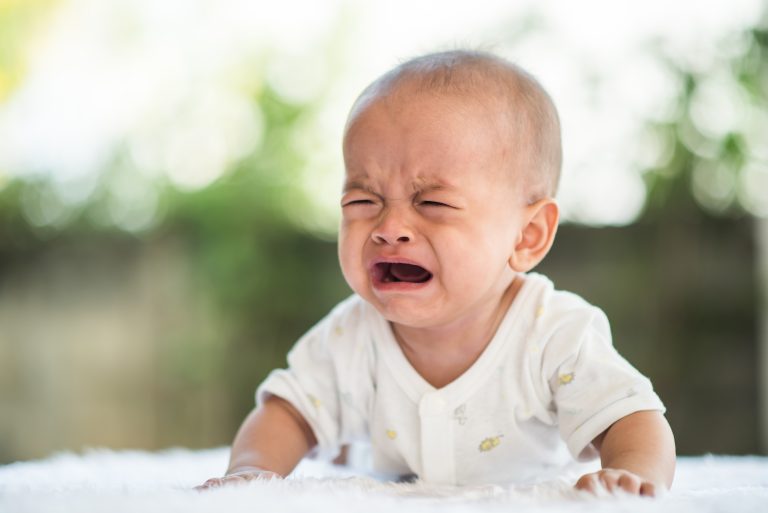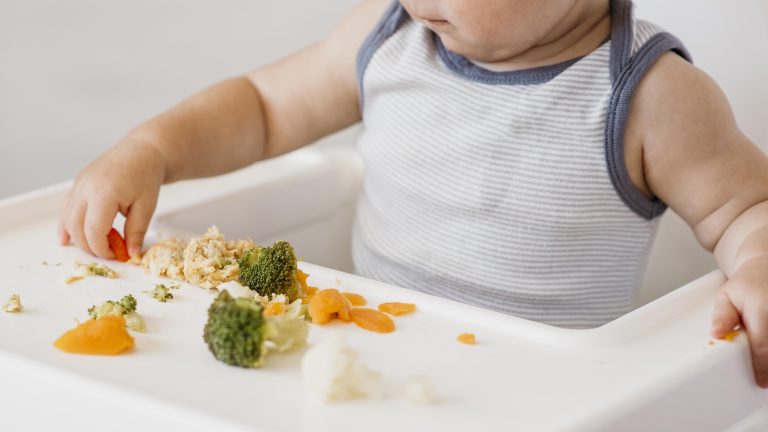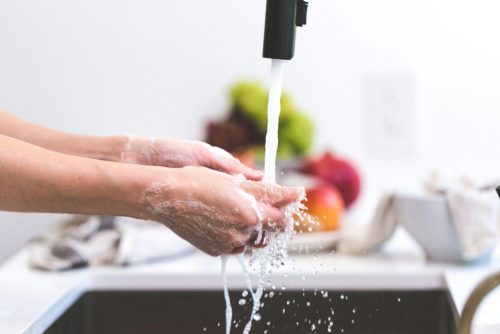
Gastroenteritis (Stomach Flu) refers to a gut (intestine) infection where there is diarrhoea (frequent passage of loose or watery stools). The infection is frequently accompanied by vomiting, which typically lasts 6 to 24 hours. Diarrhoea usually lasts 2–4 days. Occasionally, it may go on for 10–14 days. This article answers some common questions that you may have about your child’s vomiting or diarrhoea.
Many types of illnesses and medicines can cause your child’s vomiting or diarrhoea. Most often, vomiting and diarrhoea are caused by a germ called a virus. Vomiting and diarrhoea are the body’s way of getting rid of an infection or telling us that something is wrong. Infection by a virus is usually mild and does not last longer than 1 week. Your child should get better if he or she gets lots of rest, liquids, and good food. But in certain cases, your child’s illness may get serious. That can happen because vomiting and diarrhoea take water and salt away from your child’s body. If your child does not replace water and salt by drinking the right liquids, he or she can become dry. This is called dehydration and can be very serious if your child is a baby or is very young.
Using medicines to stop vomiting or diarrhoea may harm your child. Do not give your child medicines that
Your child does not need antibiotics for most illnesses that cause vomiting and diarrhoea. (Antibiotics are medicines that fight some infections.) Antibiotics do not cure viruses.
Your child should see a doctor if he or she has any of the warning signs of serious vomiting or diarrhoea. The warning signs can be different for each child. Watch your child closely. Pay attention to things that you think are different about your child’s behaviour.
See a doctor if your child has ANY of the WARNING SIGNS on this list:

When your child is experiencing vomiting or diarrhoea, providing the right care is crucial for their recovery. Use oral rehydration therapy to manage and rehydrate them. Additionally, offering healthy foods can help support their healing process.
Give your child a special liquid called an oral electrolyte solution to prevent serious dehydration. Dehydration happens when your child’s body loses water and too many salts. For the first 6 hours, make sure your child gets at least the right amount for his or her age.
What Is an Oral Electrolyte Solution?
An oral electrolyte solution is a liquid that has exactly the right amount of water, sugar, and salt. You can buy this solution in most drugstores in different forms:
Warning: You must mix the powder exactly as the instructions on the package say. This means you must use measuring spoons and measuring cups to measure the powder and the liquid. Not following these instructions may harm your child.
How Much to Feed Your Child?
If you are breastfeeding, continue to do so, but offer shorter, more frequent feedings. Breast milk remains the best liquid for your child. If your child is vomiting, use a teaspoon or syringe to give 5 mL (1 teaspoon) of liquid every 1 to 5 minutes. Avoid large drinks, as they may worsen vomiting. As your child begins to feel better, offer larger amounts less frequently but ensure they continue to get enough liquid. After 24 hours, give the oral electrolyte solution only after each episode of watery diarrhoea. Avoid sugary liquids like apple juice, Kool-Aid, and soft drinks, as they can worsen diarrhoea.
Tip: Start with small sips of the oral electrolyte solution to help your child adjust to the taste, which may be new to them.
Feeding your child healthy foods, milk, or formula will help fight your child’s infection. It will also help heal his or her stomach and intestines and prevent loss of weight. If your child is vomiting, temporarily stop giving solid foods for 6 to 12 hours, but continue breastfeeding, as it is the best nutrition for them. If your child has diarrhoea, do not withhold food. Instead, offer small amounts of preferred foods every 3 to 4 hours. Starchy foods like bread, cereals, pasta, and rice, as well as fresh fruits and vegetables, are ideal. Avoid introducing new foods or those high in sugar and fat.
Here is a list of the good foods that you should feed your child. Do not feed your child foods that are on the list of bad foods.
Do Feed Your Child
Do Not Feed Your Child
Do not let your child get dehydrated. Keep a supply of a special liquid called oral electrolyte solution in your home. Drinking this liquid helps to put salt and water back into your child’s body when he or she has vomiting or diarrhoea.

Gastroenteritis, or stomach flu, can be a challenging experience for children and their families. By being well-informed and prepared, you can help your child recover fast. SBCC Baby and Child Clinic is also here to help families through such difficult situations by providing professional care. Parental vigilance, timely attention, and well-suited support are essential to a child’s rapid recovery and uninterrupted childhood joy.
For More Information or to Book an Appointment, Contact Us Here.
Tele-consultation (within Singapore)
|
10 minute Consultation |
General Paediatrics Case |
Sub Specialty Case |
|
1st Consult |
$90 |
$120 |
|
Follow up |
$50 |
$80 |
Additional charges may apply for extended consultation with the doctor.
Delivery of Medication (within Singapore):
Orchard Road – $2, Tuas – $4, Sentosa and Airport – $10
*Tele-consultation (outside of Singapore) is only applicable for Sub Specialty Follow up.
Thank you for choosing SBCC's Tele-Consultation service. At SBCC, we strive to provide you with a seamless and effective healthcare experience. Our Tele-consultation service is different than other providers as we can schedule a tele-consult with your preferred paediatrician through our Platform.
Please go through the below terms and conditions for our Tele-Consultation process including your rights and responsibilities of this platform. These Terms and conditions, together with our privacy policy constitute an agreement between you and Healthway Medical group.
In the current COVID-19 situation, parents may be hesitant to bring their little one to clinics. With this tele-consultation service, you may consult a paediatrician on non-urgent clinical matters without leaving your home.
FOLLOW-UP for stable chronic conditions such as asthma, allergic rhinitis, food allergy, eczema, constipation, juvenile arthritis, chronic urticaria
If your child is experiencing a medical emergency, please call an ambulance at 995 or make your way to the nearest Accident & Emergency department immediately. If it is not an emergency, but you/your child do not meet the requirement for telemedicine please call our clinics for an appointment. If you need mental health support, please call SOS Hotline (1800-221 4444).
1. Fill in the online registration form and make an appointment with your preferred paediatrician.
2. Complete the payment details before submitting the online registration form.
3. You will receive an SMS and Email to confirm your registration.
4. As the tele-consult request needs to be approved by the paediatrician, you will receive an SMS and Email confirming your request.
5. You will receive a video consultation link by SMS and Email when your appointment is near.
6. Click the link to start your consultation.
7. Once complete, you will receive a link by SMS and Email on the amount payable to the clinic.
8. If you have selected delivery of medication, a delivery fee will apply to your final bill amount.
A standard delivery fee of $15.00 will be charged for medication delivery within Singapore. You will receive your medication within 3 hours.
Please note the following surcharges apply to the following area:
Your medication will be delivered to your address via a courier.
At the time of registration, we charge an amount of $1 to authenticate your credit card. However, please note that this amount is immediately reversed once your request is submitted successfully.
Payment is made via your submitted credit card details at the time of registration.
| Doctor Name | Doctor Specialty (Special Interest) |
| Dr Alison Joanne Lee | Paediatric Medicine (Allergy & Immunology) |
| Dr Chan Kit Yee | Paediatric Medicine (Cardiology) |
| Dr Charmaine Teo | Paediatric Medicine |
| Dr Jenny Tang | Paediatric Medicine (Asthma, Lung, Sleep & Allergy) |
| Dr Martha Liu | Paediatric Medicine |
| Dr Nancy Tan | Paediatric Medicine (Gastroenterology, Hepatology & Nutrition) |
| Dr Natalie Epton | Paediatric Medicine (Neonatology) |
| Dr Ratna Sridjaja | Paediatric Medicine |
| Dr Wong Chin Khoon | Paediatric Medicine |
| Dr Ng Ying Woo | Obstetrics & Gynaecology* |